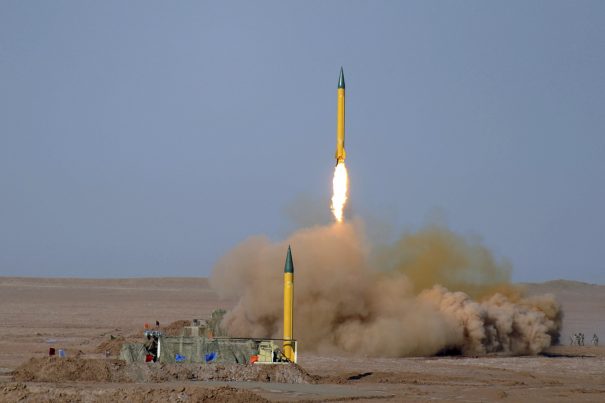
This one BIG hole in the Iran nuclear deal should kill it
Tuesday, September 01, 2015 by usafeaturesmedia
http://www.nationalsecurity.news/2015-09-01-this-one-big-hole-in-the-iran-nuclear-deal-should-kill-it

(NationalSecurity.news) While the Republican-led Congress has gone back and forth with the Obama Administration over the relative merits and pitfalls of its pending nuclear deal with Iran, sharp-eyed analysts poring over the details have spotted a glaring deficiency that ought to kill the agreement outright.
As reported by The Weekly Standard (TWS), Americans and their representatives have debated in particular whether the deal – known officially as the Joint Comprehensive Plan of Action (JCPOA) – gives nuclear site inspectors adequate access to and visibility of suspected, undisclosed Iranian atomic activities and if, in the case of an Iranian breach, sanctions will snap back in place.
However, there is a larger issue: The plan gives Iran and its friends grounds to exclude from any snapback sanctions long-term sales of Iranian oil and gas, or virtually any non-nuclear items that Iran wants to exclude.
This hole in the agreement will permit Iran and its future business partners to essentially shove through decades’ worth of oil agreements, thereby robbing future presidents of any meaningful economic leverage to use against Tehran’s mullahs if (and likely when) they cheat on the agreement.
“JCPOA Paragraph 37 governs snapback sanctions, which are the only means under the plan, for enforcing it. Paragraph 37 excludes snapping back old UN sanctions ‘with retroactive effect to contracts signed between any party and Iran or any Iranian individuals and entities prior to’ sanctions being re-imposed,” The Weekly Standard reported.
And so, once the agreement is put into force and sanctions on Iran are lifted, the country or a third-party entity could initiate long-term (like 20-year) contracts to sell to “any party” – like the Chinese, Russians, Lebanese or other parties friendly to the regime – all oil and gas, for example, that Iran chooses to sell in the future.
That is similar to “output contracts” that are used in the commercial world.
In a similar vein, Iran could also sign long-term contracts to buy or sell other non-nuclear items, and also cover additional, otherwise non-allowed, arrangements.
So yes, snapback sanctions would occur in such situations, but still leave a massive, multi-million-dollar hole.
As The Weekly Standard reported further:
Not surprisingly, Iran has already leapt at this loophole. On July 23, just nine days after announcing the JCPOA, Iran’s Minister of Industry, Mines, and Trade, Mohammad Nematzsadeh, announced preparation of a new “model contract,” initially designed for Iranian oil and gas industries, but which might later apply to other industries as well. How long would these contracts run? Twenty to twenty-five years.
Expert Lucian Pugliarisi of energy consulting firm EPRINC notes that, normally, long-term contracts to sell oil generally run only a few years. But in order to avoid re-application of sanctions, Iran and its business partners would opt for much longer agreements, or tie them to investments, or transfer of service or expertise – common items contained in longer-term contracts.
Either way, Iran would likely argue that the future business it locked down is therefore guaranteed and not subject to any new sanctions regime.
Further, Iran would not be the only advocate for such agreements. Companies and countries that benefit from them are likely to stand up for the long-term contracts as well. Peer competitor nations like Russia and China are likely to ink such deals, but so, too, are some U.S. allies like Germany and France and other EU nations – many of which have sent business delegations to Tehran already.
There is only one limit on the JCPOA’s exemption of long-term contracts, TWS notes. The JCPOA requires that “the activities contemplated under and execution of such contracts are consistent with this JCPOA and the previous and current UN Security Council Resolutions.”
That will surely include continued bans on sales to Iran of nuclear weapons-related equipment. But other agreements are excluded, as TWS reports:
Iran and its business partners will argue, with reason, that any contract entered into during the JCPOA whose activities and signing were then permissible under the Joint Plan and resolutions (when the activities were “contemplated” and the agreement “executed” or signed) would be “grandfathered” in and cannot subsequently be barred, even though such contracts would otherwise fall under renewed sanctions.
The U.S. could try to re-impose sanctions, but it would likely only be able to do so unilaterally; getting EU nations that have cut deals with Iran to re-impose economic sanctions would be difficult at best. Convincing Russia and China to do so is a pipe dream.
Further, re-imposing sanctions via the United Nations Security Council is also out; both Russia and China, as permanent members, have veto power and would surely use it to thwart the U.S.
The Obama Administration has claimed that the agreement guarantees inspector access to suspected Iranian nuclear sites within 24 days – hardly an effective enforcement tool.
Now, it seems, a major economic enforcement tool would also be rendered moot.
See also:
Tagged Under: Tags: economic sanctions, High Priority, Iran, nuclear deal






